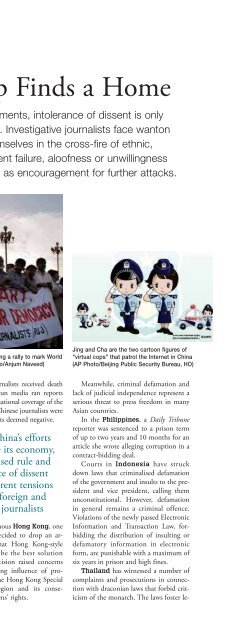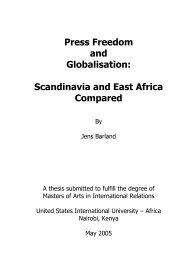FOcus On - International Press Institute
FOcus On - International Press Institute
FOcus On - International Press Institute
You also want an ePaper? Increase the reach of your titles
YUMPU automatically turns print PDFs into web optimized ePapers that Google loves.
guiding its witnesses and Akash’s request<br />
for a hearing deferment denied, even<br />
though the journalist’s main defence<br />
coun sel was unavailable.<br />
Akash was not the only journalist to<br />
allege such mistreatment. A report relea -<br />
sed in 2008 by Odhikar, a human rights<br />
organization, concluded that Noor Ah -<br />
med, editor-in-chief of the Dainik Sylhet<br />
Protidin and secretary general of the Syl -<br />
het <strong>Press</strong> Club, was detained by members<br />
of the RAB in 2007, and tortured. Ac -<br />
cused of extortion, Noor Ahmed alleges<br />
that he was repeatedly beaten with a<br />
stick, and ultimately signed a statement<br />
he could no longer read. Noor Ahmed<br />
had been investigating both the RAB and<br />
a local police inspector regarding possible<br />
corruption.<br />
Bangladeshi editors joined together<br />
for a unified call for the release of imprisoned<br />
editor Mohammad Atiqullah Khan<br />
Masud in September. IPI’s Justice Denied<br />
Campaign calls attention to the fate of<br />
Atiqullah Khan, editor of the daily<br />
Janakantha, arrested without warrant in<br />
March 2007 under the Emergency Po -<br />
wers Rules. Atiqullah Khan, an outspoken<br />
advocate of press freedom, faces a<br />
plethora of charges. The editors’ appeal<br />
for his release, supported by editors of the<br />
country’s 14 national dailies, emphasised<br />
Atiqullah Khan’s deteriorating health and<br />
the destabilizing effect of his incarceration<br />
on his newspaper’s already precarious<br />
financial situation.<br />
Bangladesh’s media environment this<br />
year was also affected by legislative developments.<br />
A controversial counterterrorism<br />
ordinance was adopted by the military-backed<br />
interim government in June.<br />
It was criticized both for being approved<br />
without public hearings, and for containing<br />
provisions susceptible to abuse. For<br />
example, terrorist acts were so broadly<br />
de fined as to include mere property cri -<br />
mes. In addition, the law introduced cri -<br />
minal penalties for speech intended to<br />
“support or bolster” the activities of a<br />
banned organization, with no requirement<br />
that incitement of criminal conduct<br />
is demonstrated.<br />
The new Right to Information law<br />
provided at least partly positive news,<br />
though many considered it insufficient.<br />
The law, approved by the advisers to the<br />
interim administration in September,<br />
was published in the official Bangladesh<br />
Gazette on 20 October. It was lauded for<br />
Bangladesh Awami League President<br />
and former PM Sheik Hasina<br />
(Reuters/Andrew Biraj)<br />
applying broadly to all information held<br />
by all public bodies, but the press freedom<br />
organisation Article 19 noted several<br />
deficiencies. In particular, the organization<br />
voiced concern regarding the ma -<br />
ny available exemptions, with as many as<br />
20 instances permitting request denials,<br />
including cases of corruption. The law al -<br />
so failed to protect good-faith disclosures.<br />
Towards the end of the year, all attention<br />
focussed on the landmark elections<br />
held on 29 December. An IPI mission<br />
that travelled to Dhaka from 27 Novem -<br />
ber to 2 December elicited commitments<br />
to an open media environment during<br />
elections from the main political parties,<br />
the Interim Administration and the<br />
Election Commission. Furthermore, representatives<br />
of the political parties that<br />
met with the IPI mission pledged to<br />
investigate the killings of more than a<br />
dozen journalists.<br />
Recommendations<br />
End impunity in the crimes against<br />
journalists<br />
Bring Bangladeshi laws in line<br />
with international standards<br />
on press freedom<br />
Enact a broadcasting law including<br />
provisions supporting media freedom,<br />
as well as a suitable commitment<br />
to public service<br />
Mission<br />
<strong>Press</strong> Freedom in Bangladesh<br />
From 27 November to 2 December<br />
2008, IPI conducted a high-level<br />
mis sion to Dhaka, Bangladesh to assess<br />
the country’s media environment ahead<br />
of the 29 December National Elections,<br />
as well as to elicit commitments from the<br />
heads of the two main political parties to<br />
support the right of journalists to report<br />
on the general elections without harassment<br />
or interference.<br />
The mission included IPI Director<br />
David Dadge; Owais Aslam Ali, Sec re ta -<br />
ry General of the Pakistan <strong>Press</strong> Foun d -<br />
ation (PPF) and Chairman of Pakistan<br />
<strong>Press</strong> <strong>International</strong> (PPI), Karachi; and<br />
Padma Singh Karki, Chairman of the IPI<br />
Nepal National Committee and editor<br />
and publisher of the Gatibidhi Weekly in<br />
Kathmandu. Bulbul Monjurul Ahsan,<br />
Head of News and Current Affairs at<br />
ATN Bangla and Executive Director of<br />
Media Watch, Bangladesh, was the local<br />
coordinator for the mission.<br />
Perpetrators of crimes<br />
against journalists are<br />
gene rally not prosecuted<br />
and the authorities<br />
do not seem to take the<br />
cases seriously<br />
The members of the IPI mission met<br />
with journalists, editors and media owners<br />
as well as with the head of the Awami<br />
League, leaders of the Bangladesh Natio -<br />
n alist Party (BNP), the Chief Advisor to<br />
the Interim Government, the Directorate<br />
General of Forces Intelligence, the At -<br />
torney General, and the Chief Election<br />
Commissioner, among others.<br />
Meetings with Editors<br />
and Journalists<br />
<strong>On</strong>e of the main problems highlighted by<br />
journalists is that media outlets in Bang -<br />
ladesh are politically polarized, and tend<br />
to favour either the Awami League or the<br />
BNP, the two main political parties.<br />
Some journalists noted that they should<br />
attempt to bridge this divide by agreeing<br />
on best practices of journalism, rather<br />
than focussing on supporting particular<br />
political parties.<br />
Editors expressed concern about laws<br />
and practices that have a chilling effect<br />
on their ability to report on issues of public<br />
interest. Criminal defamation was spe -<br />
cifically mentioned as a problem.<br />
13
















